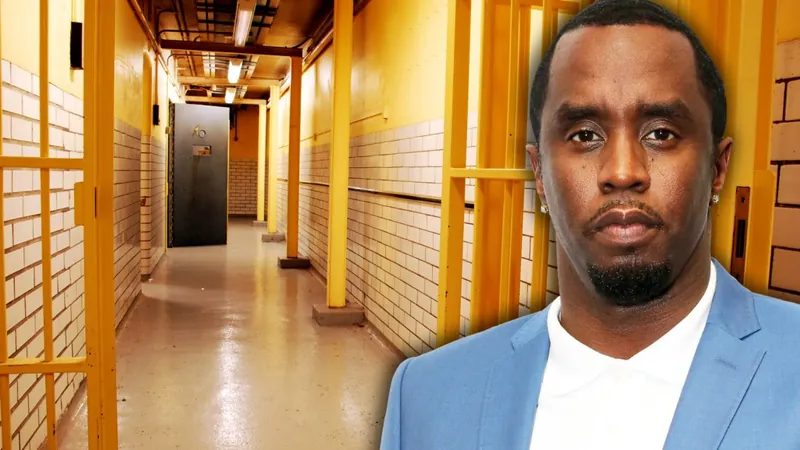
Breakthrough Drug Offers Hope for Laryngeal Dystonia Sufferers Like RFK Jr.
2024-11-20
Author: Jia
Breakthrough Drug Offers Hope for Laryngeal Dystonia Sufferers Like RFK Jr.
In a groundbreaking development, researchers have identified a drug that may help individuals suffering from laryngeal dystonia (LD), a condition characterized by involuntary spasms of the vocal cords that result in strained and hoarse speech. This discovery comes amidst renewed interest in LD following the appointment of Robert F. Kennedy Jr., a prominent figure who has the condition, to a high-profile position in the new administration.
The Challenge of Laryngeal Dystonia
Laryngeal dystonia affects many individuals, including prominent figures such as U.S. journalist Diane Rehm, who have experienced career-altering consequences due to the disorder. Current treatment options, like Botox (botulinum toxin), fail to provide relief for nearly 40% of patients, leaving them searching for effective solutions.
Dr. Kristina Simonyan, the lead investigator on the research team, expressed the urgency for new treatment avenues, saying, “Many patients share stories of how LD has disrupted their lives and careers—they're in desperate need of effective treatments.”
The Surprising Connection to Alcohol
The researchers' journey began with anecdotal evidence from patients who noted that a few alcoholic drinks seemed to ease their symptoms. Sodium oxybate is chemically similar to gamma-hydroxybutyric acid (GHB), a neurotransmitter that can produce effects comparable to those of alcohol, yet it's distinct from its illegal counterpart, which poses significant health risks.
To evaluate sodium oxybate's effectiveness, the researchers conducted an initial experiment where 106 LD patients were given vodka shots. While 56 showed no change, the remaining 50 experienced smoother speech. This prompted further investigation with a controlled dose of sodium oxybate, which demonstrated that patients who responded well to alcohol also found relief from their symptoms after taking the prescribed medication.
Promising Results with Caution
The results from the study showed that the effects of sodium oxybate could last up to five hours, substantially improving the speech of responsive patients without serious side effects, though mild nausea and dizziness were reported. The researchers are now ready to embark on larger, Phase 3 trials to further substantiate these findings.
Responses from experts within the field highlight the importance of this research. Jemma Haines from the Royal College of Speech and Language Therapists remarked that this work opens new possibilities for treatment, offering hope to those struggling with communication disorders.
Dayna Ferdinadni from Dystonia UK cautioned, however, that sodium oxybate has yet to receive official approval from the National Institute for Health and Care Excellence (NICE) or the NHS for treating LD. “While we welcome this promising research,” she noted, “it is imperative that the drug undergoes thorough evaluation to assess its safety and long-term impacts before becoming a standard treatment.”
The Future for LD Patients
Currently, the causes of laryngeal dystonia remain unclear, making management strategies essential, including vocal exercises and relaxation techniques. Symptoms typically surface in midlife, significantly impacting quality of life and communication abilities. Kennedy, who experienced a rapid decline in vocal strength starting at age 42, recently underwent experimental surgery in Japan that he claims has improved his voice.
This exciting revelation surrounding sodium oxybate's potential not only provides hope for Kennedy and other LD sufferers but highlights the ongoing need for innovative research into effective therapies for this challenging condition. As scientists continue to explore new frontiers, the road ahead may yield further breakthroughs that transform the lives of those afflicted by laryngeal dystonia.


 Brasil (PT)
Brasil (PT)
 Canada (EN)
Canada (EN)
 Chile (ES)
Chile (ES)
 España (ES)
España (ES)
 France (FR)
France (FR)
 Hong Kong (EN)
Hong Kong (EN)
 Italia (IT)
Italia (IT)
 日本 (JA)
日本 (JA)
 Magyarország (HU)
Magyarország (HU)
 Norge (NO)
Norge (NO)
 Polska (PL)
Polska (PL)
 Schweiz (DE)
Schweiz (DE)
 Singapore (EN)
Singapore (EN)
 Sverige (SV)
Sverige (SV)
 Suomi (FI)
Suomi (FI)
 Türkiye (TR)
Türkiye (TR)